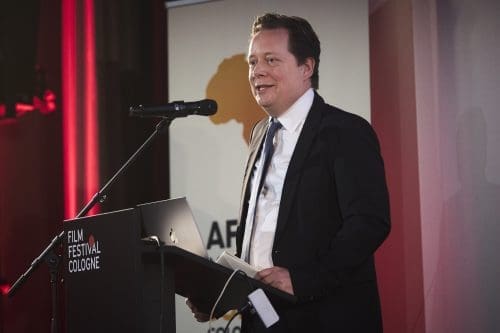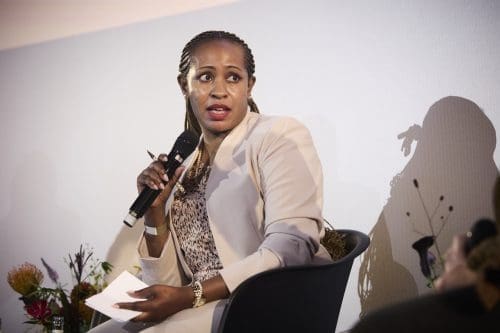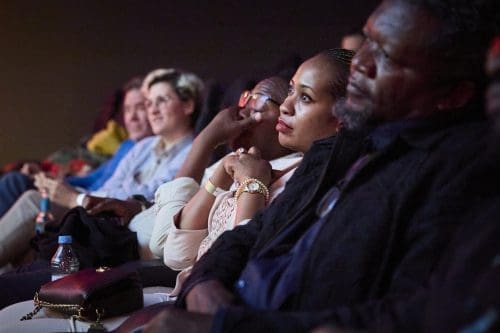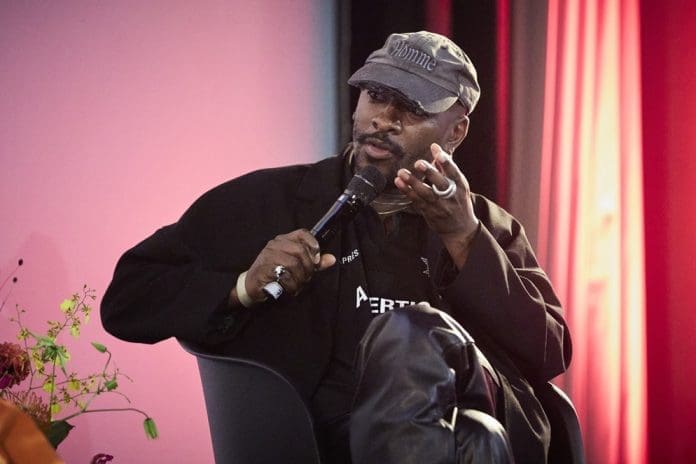The inaugural Africa XChange Summit wrapped up in Cologne this week, marking what organizers hope becomes a turning point for how the continent’s creative powerhouses connect with global partners. Running October 15 and 16 as part of Film Festival Cologne, the conference brought African filmmakers, tech entrepreneurs, and investors face to face with European counterparts who suddenly realize they’ve been sleeping on massive opportunities.
The summit opened Wednesday evening with a screening of “My Father’s Shadow,” the semi-autobiographical Nigerian drama that became the first Nigerian film selected for Cannes Film Festival’s official competition. Director Akinola Davies Jr.’s feature debut follows two young brothers spending an unforgettable day in Lagos with their estranged father during the turbulent 1993 Nigerian election. The film captures both intimate family dynamics and sweeping political upheaval through a child’s perspective, and the United Kingdom selected it as its Oscar entry for Best International Feature Film.

That screening choice carried symbolic weight. Nigeria’s film industry, popularly known as Nollywood, produces more than 2,500 movies annually, making it the second largest film industry globally by output, trailing only India’s Bollywood. Yet despite this prolific production, African cinema has struggled for decades to secure equal footing in international markets and major film festivals. Davies’s Cannes breakthrough represents exactly the kind of validation the summit aims to amplify.
Discussions throughout the two days zeroed in on the economics underlying Africa’s creative explosion. UNESCO estimates the African film industry could employ 20 million people and generate $20 billion in revenue annually, numbers that make investors sit up straight. But reaching that potential requires solving persistent financing gaps, improving production infrastructure, and building distribution networks that extend beyond continental audiences.
Demographic forces work heavily in Africa’s favor. The continent boasts the world’s youngest population, with a median age under 20 in many countries. These digital natives consume content voraciously through smartphones and increasingly affordable internet connections. Streaming platforms have started noticing. Netflix, Amazon Prime, and regional services now commission original African productions, recognizing attractive markets where traditional Hollywood offerings often miss cultural marks.
Nigeria provides the most dramatic example of what grassroots creativity can achieve under difficult circumstances. Nollywood emerged in the early 1990s when economic collapse shuttered movie theaters and state television networks couldn’t afford programming. Filmmakers grabbed VHS cameras and started shooting stories that resonated with local audiences, distributing through informal street markets. Quality varied wildly, scripts sometimes existed only in actors’ heads, and production values stayed minimal. But audiences couldn’t get enough of seeing their own lives, languages, and concerns reflected onscreen.
The industry professionalized gradually over three decades. Better equipment became accessible. Government funding programs launched. Film schools trained new generations. Contemporary Nollywood productions increasingly match international technical standards while maintaining the authentic cultural perspectives that made the industry successful initially. Directors like Davies, who studied abroad before establishing careers in Nigeria, bring polished filmmaking techniques to distinctly Nigerian stories.

Yet challenges persist beyond financing. Piracy remains rampant, with estimates suggesting nine of every ten Nigerian videos sold represent illegal copies. Intellectual property frameworks that Western markets take for granted function poorly or not at all in many African contexts. Chain of title documentation, essential for international distribution deals, often doesn’t exist for films produced through informal networks. These structural issues deter institutional investors even as creative output soars.
The summit positioned itself as addressing exactly these gaps. Philipp Hoffmann, Managing Director at Rushlake Media, explained the company organized the conference because Germany needs to recognize Africa’s creative dynamism. His Cologne and Nairobi based firm uses its multi-platform network making international and African content globally accessible, giving him front row seats to opportunities others overlook. Young creative people across the continent develop innovative solutions to local challenges and build successful business models, often more effectively than importing familiar Western approaches would achieve.
Film curator Nadia Denton assembled the program, drawing on her extensive experience with the Berlinale’s European Film Market and BFI London Film Festival selection committees. She characterized the summit as a timely intervention showcasing fresh perspectives where talent and experience converge. The event aimed bridging cultures, amplifying authentic storytelling, and illuminating spaces competitors haven’t yet explored. Conversations facilitated during these two days should catalyze increased cross sector collaboration with impacts felt across borders, she suggested.
Representatives from funding initiatives including HEVA Fund, Ubongo, and Known Associates Group participated in discussions about mechanisms for strengthening film industries across Africa. The Film und Medienstiftung NRW, North Rhine-Westphalia’s public film fund, supported the summit, with Managing Director Walid Nakschbandi emphasizing that Africa’s dynamism, creativity, and cultural diversity carry growing significance for global media landscapes. His institution prioritizes bringing cultures together, building bridges across geographical and mental boundaries, promoting joint projects and partnership based cooperation as drivers of progress, innovation, and understanding.
Gaming and technology sectors received attention alongside film. Africa’s tech startup scene explodes with innovation, often leapfrogging legacy infrastructure constraints Western markets still navigate. Mobile money transforms financial services. Solar power and battery storage solve electricity access problems. Entrepreneurs develop hyperlocal solutions that multinational corporations struggle replicating. This entrepreneurial energy extends naturally into creative industries where digital distribution eliminates traditional gatekeepers.
The Cologne location provided strategic advantages. Germany’s robust film financing infrastructure, established co-production frameworks, and tradition of international cultural collaboration create potential models for African European partnerships. North Rhine Westphalia specifically offers substantial regional funding programs that could potentially include African co-productions within appropriate frameworks. Whether those frameworks expand to accommodate the partnerships discussed at the summit remains to be seen.
African films increasingly conquer European cinema screens while receiving nominations for prestigious events like the Oscars and gaining recognition at international film festivals. This visibility creates both opportunity and challenge. Success stories demonstrate audience appetite for authentic African narratives, yet distribution patterns often favor films conforming to international festival aesthetics rather than commercially viable local content. Balancing artistic recognition with commercial sustainability remains ongoing tension within African film industries.
What separates this summit from countless other networking conferences is its explicit focus on partnerships of equals rather than aid relationships. Hoffmann stressed that Africans don’t need handouts but rather access to broader international markets and financial resources. The continent’s growing self confidence is justified as people actively take their futures into their own hands. Germany particularly needs updating its perceptions, he argued. Too often, outdated assumptions prevent recognizing contemporary African realities.

For filmmakers, tech entrepreneurs, and investors who attended, the summit represented concentrated opportunity to engage potential partners in ways daily business rarely permits. Whether those connections translate into actual deals, co-productions, and sustained collaboration will become clear over coming months and years. The test of any conference ultimately lies not in what gets discussed but what happens afterward.
The Africa XChange Summit established itself as a platform worth watching. If organizers succeed in making this an annual event, it could genuinely shift how African and European creative industries interact. The potential certainly exists. Africa’s young, creative populations aren’t waiting for permission to build the entertainment industries they want. The question is whether international partners recognize that reality fast enough to participate meaningfully rather than just observe from the sidelines.
Source: newsghana.com.gh











